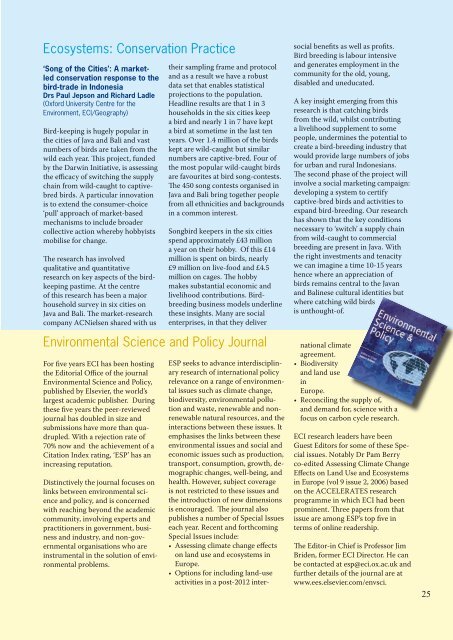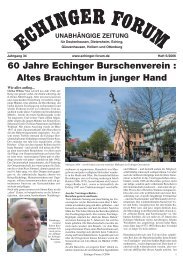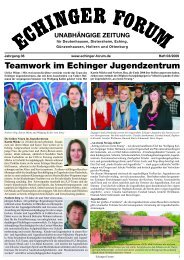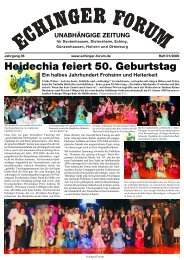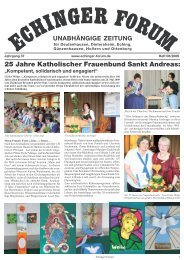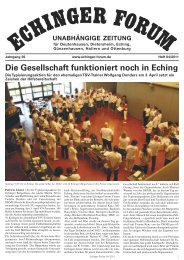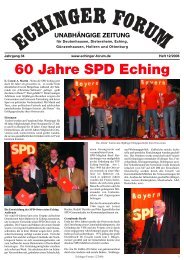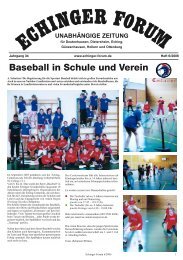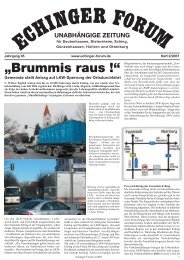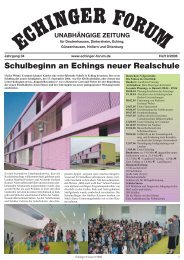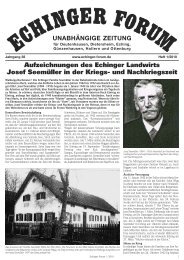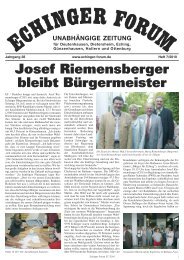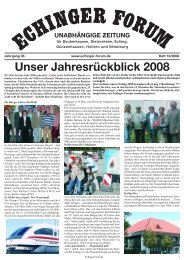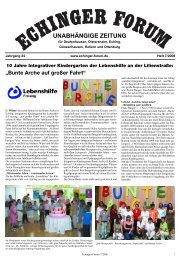Büro Karl Holmer Sachverständiger für Kraftfahrzeuge - Echinger Forum
Büro Karl Holmer Sachverständiger für Kraftfahrzeuge - Echinger Forum
Büro Karl Holmer Sachverständiger für Kraftfahrzeuge - Echinger Forum
Create successful ePaper yourself
Turn your PDF publications into a flip-book with our unique Google optimized e-Paper software.
Ecosystems: Conservation Practice<br />
‘Song of the Cities’: A marketled<br />
conservation response to the<br />
bird-trade in Indonesia<br />
Drs Paul Jepson and Richard Ladle<br />
(Oxford University Centre for the<br />
Environment, ECI/Geography)<br />
Bird-keeping is hugely popular in<br />
the cities of Java and Bali and vast<br />
numbers of birds are taken from the<br />
wild each year. This project, funded<br />
by the Darwin Initiative, is assessing<br />
the efficacy of switching the supply<br />
chain from wild-caught to captivebred<br />
birds. A particular innovation<br />
is to extend the consumer-choice<br />
‘pull’ approach of market-based<br />
mechanisms to include broader<br />
collective action whereby hobbyists<br />
mobilise for change.<br />
The research has involved<br />
qualitative and quantitative<br />
research on key aspects of the birdkeeping<br />
pastime. At the centre<br />
of this research has been a major<br />
household survey in six cities on<br />
Java and Bali. The market-research<br />
company ACNielsen shared with us<br />
their sampling frame and protocol<br />
and as a result we have a robust<br />
data set that enables statistical<br />
projections to the population.<br />
Headline results are that 1 in 3<br />
households in the six cities keep<br />
a bird and nearly 1 in 7 have kept<br />
a bird at sometime in the last ten<br />
years. Over 1.4 million of the birds<br />
kept are wild-caught but similar<br />
numbers are captive-bred. Four of<br />
the most popular wild-caught birds<br />
are favourites at bird song-contests.<br />
The 450 song contests organised in<br />
Java and Bali bring together people<br />
from all ethnicities and backgrounds<br />
in a common interest.<br />
Songbird keepers in the six cities<br />
spend approximately £43 million<br />
a year on their hobby. Of this £14<br />
million is spent on birds, nearly<br />
£9 million on live-food and £4.5<br />
million on cages. The hobby<br />
makes substantial economic and<br />
livelihood contributions. Birdbreeding<br />
business models underline<br />
these insights. Many are social<br />
enterprises, in that they deliver<br />
Environmental Science and Policy Journal<br />
For five years ECI has been hosting<br />
the Editorial Office of the journal<br />
Environmental Science and Policy,<br />
published by Elsevier, the world’s<br />
largest academic publisher. During<br />
these five years the peer-reviewed<br />
journal has doubled in size and<br />
submissions have more than quadrupled.<br />
With a rejection rate of<br />
70% now and the achievement of a<br />
Citation Index rating, ‘ESP’ has an<br />
increasing reputation.<br />
Distinctively the journal focuses on<br />
links between environmental science<br />
and policy, and is concerned<br />
with reaching beyond the academic<br />
community, involving experts and<br />
practitioners in government, business<br />
and industry, and non-governmental<br />
organisations who are<br />
instrumental in the solution of environmental<br />
problems.<br />
ESP seeks to advance interdisciplinary<br />
research of international policy<br />
relevance on a range of environmental<br />
issues such as climate change,<br />
biodiversity, environmental pollution<br />
and waste, renewable and nonrenewable<br />
natural resources, and the<br />
interactions between these issues. It<br />
emphasises the links between these<br />
environmental issues and social and<br />
economic issues such as production,<br />
transport, consumption, growth, demographic<br />
changes, well-being, and<br />
health. However, subject coverage<br />
is not restricted to these issues and<br />
the introduction of new dimensions<br />
is encouraged. The journal also<br />
publishes a number of Special Issues<br />
each year. Recent and forthcoming<br />
Special Issues include:<br />
• Assessing climate change effects<br />
on land use and ecosystems in<br />
Europe.<br />
• Options for including land-use<br />
activities in a post-2012 inter-<br />
social benefits as well as profits.<br />
Bird breeding is labour intensive<br />
and generates employment in the<br />
community for the old, young,<br />
disabled and uneducated.<br />
A key insight emerging from this<br />
research is that catching birds<br />
from the wild, whilst contributing<br />
a livelihood supplement to some<br />
people, undermines the potential to<br />
create a bird-breeding industry that<br />
would provide large numbers of jobs<br />
for urban and rural Indonesians.<br />
The second phase of the project will<br />
involve a social marketing campaign:<br />
developing a system to certify<br />
captive-bred birds and activities to<br />
expand bird-breeding. Our research<br />
has shown that the key conditions<br />
necessary to ‘switch’ a supply chain<br />
from wild-caught to commercial<br />
breeding are present in Java. With<br />
the right investments and tenacity<br />
we can imagine a time 10-15 years<br />
hence where an appreciation of<br />
birds remains central to the Javan<br />
and Balinese cultural identities but<br />
where catching wild birds<br />
is unthought-of.<br />
•<br />
•<br />
national climate<br />
agreement.<br />
Biodiversity<br />
and land use<br />
in<br />
Europe.<br />
Reconciling the supply of,<br />
and demand for, science with a<br />
focus on carbon cycle research.<br />
ECI research leaders have been<br />
Guest Editors for some of these Special<br />
issues. Notably Dr Pam Berry<br />
co-edited Assessing Climate Change<br />
Effects on Land Use and Ecosystems<br />
in Europe (vol 9 issue 2, 2006) based<br />
on the ACCELERATES research<br />
programme in which ECI had been<br />
prominent. Three papers from that<br />
issue are among ESP’s top five in<br />
terms of online readership.<br />
The Editor-in Chief is Professor Jim<br />
Briden, former ECI Director. He can<br />
be contacted at esp@eci.ox.ac.uk and<br />
further details of the journal are at<br />
www.ees.elsevier.com/envsci.


